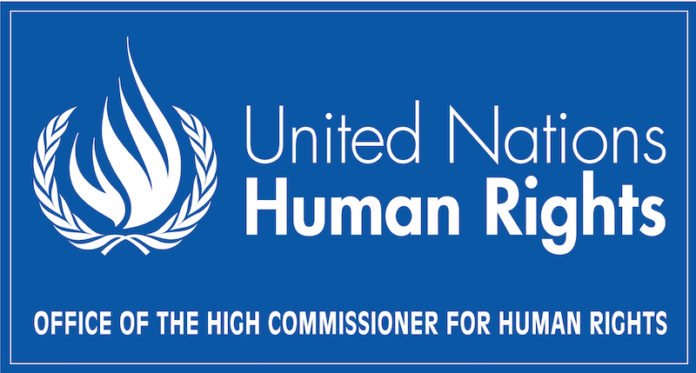A United Nations subcommittee and a group of UN experts have called on member states to take non-discriminatory measures including the early release of prison inmates due to the threat posed by the novel coronavirus.
The UN Subcommittee on Prevention of Torture and other Cruel, Inhuman or Degrading Treatment or Punishment (SPT) has issued detailed advice on a range of actions governments and independent monitoring bodies should take to protect people deprived of their liberty during the COVID-19 pandemic.
The public advice provides measures for authorities concerning all places of deprivation of liberty, including prisons, immigration detention facilities, closed refugee camps and psychiatric hospitals, in order to mitigate the risks to health created by the coronavirus.
The measures include considering reducing prison populations by implementing schemes of early, provisional or temporary release of low-risk offenders; reviewing all cases of pre-trial detention; extending the use of bail for all but the most serious cases; and reviewing and reducing the use of immigration detention and closed refugee camps. The advice also emphasizes that all detainees, people in quarantine and closed medical settings, their families and all staff, should receive reliable, accurate and the latest information concerning all adopted measures.
“Within the space of a few short weeks, coronavirus has had a profound impact on the daily life of everyone. Within prisons and other settings of deprivation of liberty, many of which are severely overcrowded and insanitary, there are increasingly acute problems which require immediate action,” said Sir Malcolm Evans, chairperson of the SPT.
“Governments have to take precautionary measures necessary to prevent the spread of infection, and to implement emergency measures to ensure detainees have access to appropriate levels of health care and to maintain contact with families and the outside world,” he added.
The advice also calls on independent national monitoring bodies, officially known as national preventive mechanisms (NPM), to continue exercising their preventive mandate during the pandemic, including visits to places of detention when possible, bearing in mind the legitimate social contact restrictions and the “do no harm” principle. The advice stresses that NPMs must be able to continue their preventive work, even if full access to places of deprivation of liberty is temporarily restricted.
Parallel to this, the special procedures of the UN Human Rights Council — independent human rights experts with mandates to report and advise on human rights from a thematic or country-specific perspective — made an appeal to governments in a similar vein. “People with disabilities, older persons, minority communities, indigenous peoples, internally displaced people, people affected by extreme poverty and living in overcrowded settings, people who live in residential institutions, people in detention, homeless people, migrants and refugees, people who use drugs, LGBT and gender diverse persons – these and other groups need to receive support from governments,” said the UN experts.
“Everyone, without exception, has the right to life-saving interventions and this responsibility lies with the government. The scarcity of resources or the use of public or private insurance schemes should never be a justification to discriminate against certain groups of patients,” the special procedures said. “Everybody has the right to health.”
“People with disabilities, older persons, minority communities, indigenous peoples, internally displaced people, people affected by extreme poverty and living in overcrowded settings, people who live in residential institutions, people in detention, homeless people, migrants and refugees, people who use drugs, LGBT and gender diverse persons – these and other groups need to receive support from governments.”
“Advances in biomedical sciences are very important to realize the right to health. But equally important are all human rights. The principles of non-discrimination, participation, empowerment and accountability need to be applied to all health-related policies.”
The UN experts supported the measures recommended by the World Health Organization (WHO) to defeat the pandemic. They called on states to act with determination to provide the needed resources to all sectors of public health systems – from prevention and detection to treatment and recovery.
“But addressing this crisis is more than that. States must take additional social protection measures so that their support reaches those who are at most risk of being disproportionately affected by the crisis,” they stressed.
“That includes women, who are already at a disadvantaged socio-economic position, bear an even heavier care burden, and live with a heightened risk of gender-based violence.”
The group of experts expressed their gratitude and admiration to health workers around the world who heroically battle the outbreak, saying: “They face huge workloads, risk their own lives and are forced to face painful ethical dilemmas when resources are too scarce. Healthcare workers need to have all possible support from States, business, media and the public at large.
“COVID-19 is a serious global challenge,” the experts said. “But it is also a wake-up call for the revitalization of universal human rights principles. These principles and trust in scientific knowledge must prevail over the spread of fake news, prejudice, discrimination, inequalities and violence.
“We all together face this unprecedented challenge. The business sector in particular continues to have human rights responsibilities in this crisis. Only with concerted multilateral efforts, solidarity and mutual trust, will we defeat the pandemic while becoming more resilient, mature and united.
“When the vaccine for COVID-19 comes, it should be provided without discrimination. Meanwhile, as it is still to come, the human rights-based approach is already known as another effective pathway in the prevention of major public health threats,” the experts concluded.
Last week UN High Commissioner for Human Rights Michelle Bachelet called on UN member states to immediately release political prisoners and government critics under detention.









